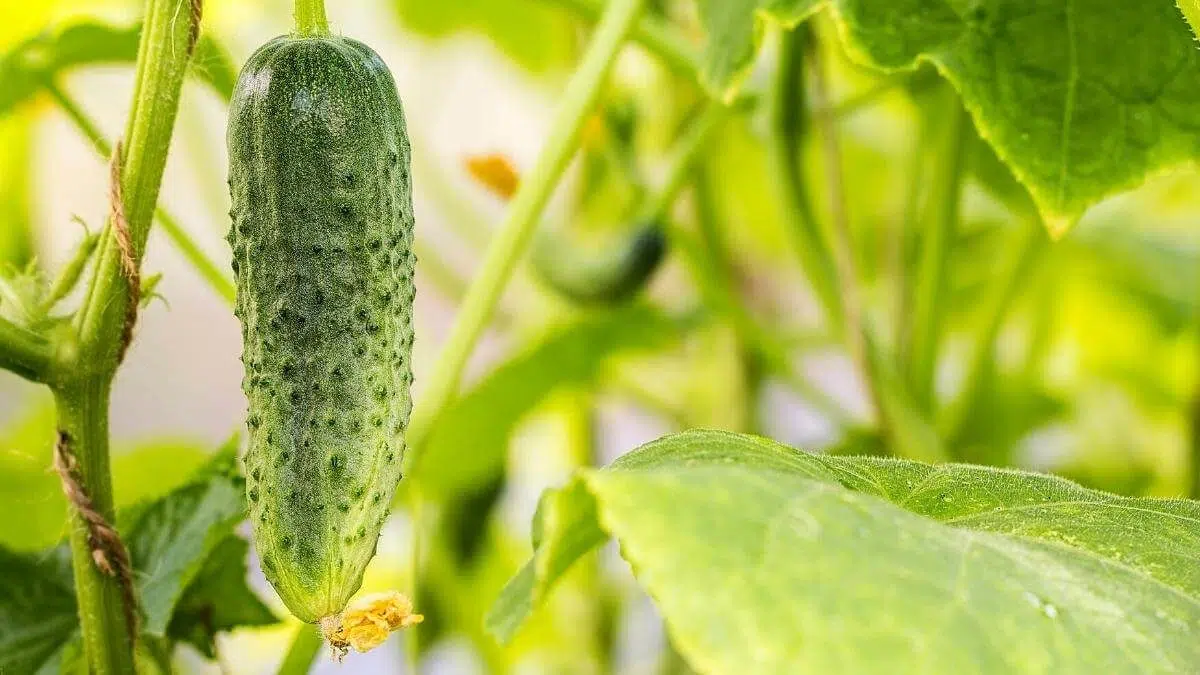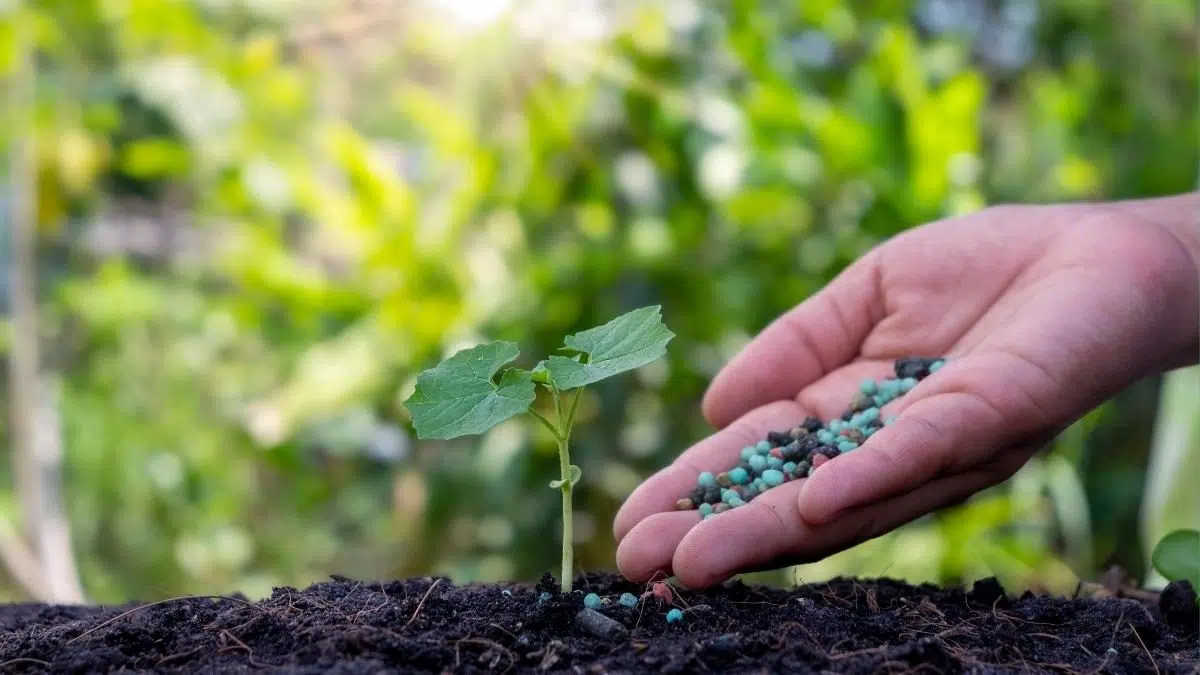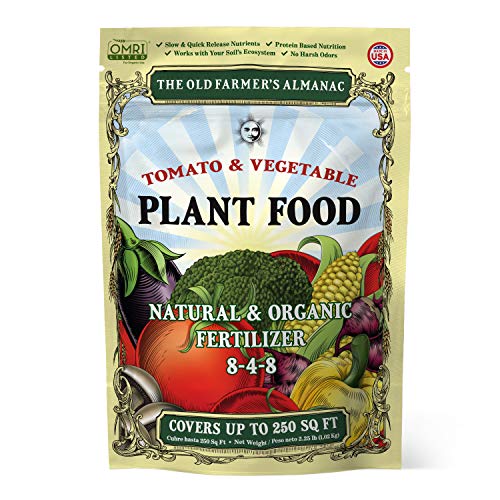Nutrients are required for plants to grow, but most soil these days are lacking in some form of those nutrients, making a fertilizer when growing cucumbers almost necessary.
Cucumbers are considered heavy feeders and need lots of potassium, phosphorous, and nitrogen in order to produce the big leaves that cucumber plants need to soak up more of the sun’s energy for leaf growth.
Nitrogen promotes stem and leaf growth, but too much nitrogen can lead to no fruit being produced and just a lot of leaves.
What Are the Best Cucumber Fertilizers?
Cucurbits, including cucumbers, need low nitrogen and high potassium and phosphorous fertilizers. Before you choose a fertilizer you do want to get a soil test done to see if your soil quality is good or if it is deficient or has too much of a certain nutrient. This will help you better determine which fertilizer is best so you don’t add the wrong amount.

There are cucumber fertilizers that you can apply directly to the cucumber plant, but it is always better for cucumbers to have more readily available nutrients in their soil than to have immediate nutrition. Cucumbers also absorb nutrients from the water they drink, so cucumber fertilizer added to their water will be absorbed much more easily.
There are many options, but the best cucumber fertilizers all have one thing in common: they all have a high level of phosphorus and potassium.
Here are some of the best organic fertilizer options on the market.
1. AgroThrive Organic Liquid Fertilizer
- Type: Liquid
- Nutrient Ratio: 3-3-2 NPK
I used this on my entire garden last season and had great results – and I have mostly clay soil. The cucumbers grew really well and gave me SO many cucumber fruits I had to make a ton of pickles to preserve them and give some away.
I like that it has natural ingredients and isn’t just another Miracle Gro type product.
- OMRI, CDFA, and WSDA Listed Organic
- Comes from organic fish and grains
- A mixture of slow-release and quick-release fertilizers
Agro Thrive is great for most vegetables and herbs and is a super-concentrated formula that lasts for a long time. You mix 2-4 oz into a gallon of water and add it to the soil. You can even use this fertilizer on your lawn.
2. Old Farmer’s Almanac Tomato & Vegetable Fertilizer
- Type: Granular
- Nutrient Ratio: 8-4-8 NPK
This OMRI-listed option has been specially formulated for tomatoes and other vegetables. Considering that tomatoes and cucumbers are both heavy feeders, this is a great option.
While this is called a tomato fertilizer, it’s a great all-purpose garden fertilizer that will help with fruit production in your garden vegetables.
- OMRI Listed
- Resealable bag
- Slow-release fertilizer for providing nutrients over time
Great for feeding cucumbers and nightshade plants like tomatoes. One bag covers around 250 square feet of garden space.
3. Dr. Earth Organic Vegetable Fertilizer
- Type: Granular Fertilizer
- Nutrient Ratio: 4-6-3 NPK Ratio
Dr. Earth’s organic fertilizer touts itself as the only Non-GMO fertilizer in the USA and it’s also made in the USA. It contains their specially formulated TruBiotic which has probiotic beneficial mycorrhizae and microbes. I always try to use organic fertilizers when possible to not introduce additional chemicals to the earth.
4. Jobe’s Organic Vegetable Fertilizer
- Type: Granular
- Nutrient Ratio: 2-7-4 Ratio
- OMRI Listed
- Contains Jobe Biozome; Extremely aggressive proprietary microorganism archaea that aggressively breaks down material for faster results
- No synthetic chemicals
Jobe’s fertilizer is a fast-acting option for getting a more robust harvest of cucumbers. Their specially formulated “Biozome” helps improve soil conditions as well.
5. Espoma Garden-Tone
- Type: Granular fertilizer
- Nutrient Ratio: 3-4-4 Ratio
Espoma is one of the more popular names in gardening fertilizers and plant food. Their Garden-Tone product was initially designed for professional gardeners but worked so well they began selling it to home gardeners.
How to Apply Cucumber Fertilizers Properly for the Best Results
Most cucumbers should be fertilized when you transplant the cucumber plants into your garden bed.
Make sure to follow the instructions on whichever brand you do choose, as you can cause issues and yellowing leaves and fertilizer burn by using too much fertilizer. A little planning can make all the difference.
What Types of Fertilizers Are There?
There are a few methods of applying fertilizer to help your plants grow and get the proper nutrients.
Fertilizer Spikes
Fertilizer spikes are great for beginner gardeners because they are hard to get wrong and overfertilize. But they often come with additional chemicals built in and are usually better for indoor houseplants than the garden.
Spikes are often considered a slow-release fertilizer because they don’t break down as quickly as a liquid fertilizer does.

Granular Fertilizer
Granular fertilizers are little pellets of fertilizer that you can spread around your cucumber plants. As the name implies, they come as granules and can do quite well at providing nutrients to your plants.
Liquid Fertilizers
Liquid fertilizers act the fastest because the plant and soil microbes don’t need to break them down. Because they are fast-releasing, it can be easy to overdo it with these so test these out slowly.
A water-soluble fertilizer gets down to the plant’s roots fast and is great for fertilizing plants. This is my favorite liquid fertilizer.
How Often Should Cucumbers be Fertilized?
Cucumbers should be fertilized around the time you transplant cucumbers into their final resting spot. If you start seeds indoors, after the germination period they are going to need some additional nutrients, so you should be fertilizing cucumbers at that point as well.
After that, they might need additional fertilizer every few weeks, or if you start to notice discoloration in the leaves or slow growth.
Other Fertilizer for Cucumbers Ideas
Worm castings make a great fertilizer for the entire garden! If you’ve set up a worm farm and have that ready to go, you should absolutely use it!
Compost and/or cow manure is another great option for getting decent plant growth. As opposed to synthetic fertilizers, these come from natural products and can help cucumber seedlings grow into healthy plants in your vegetable garden.
It's important to get a soil test done before choosing a fertilizer to understand what nutrients your soil is deficient in.
- pH Analysis
- Nutrient Analysis
- Custom recommendations based on your test results








